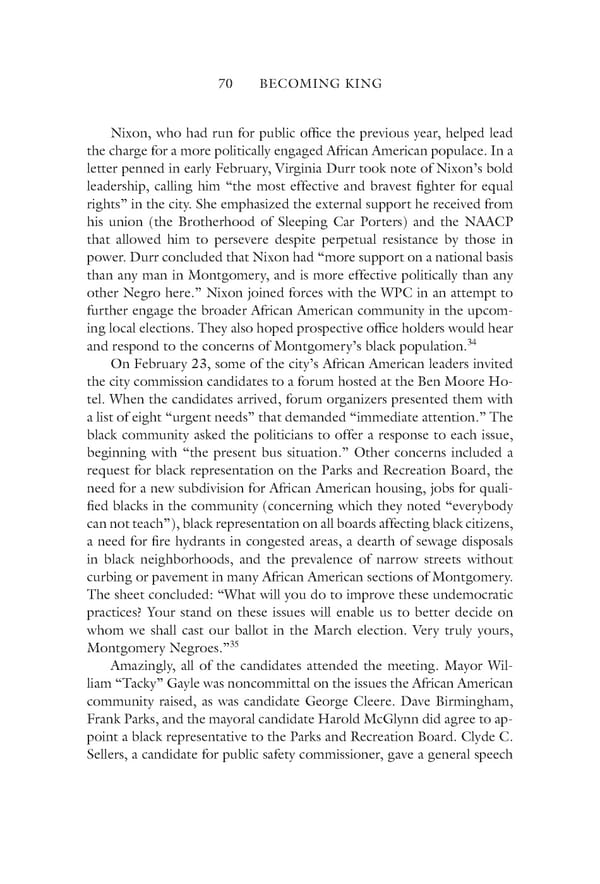70 BECOMING KING Nixon, who had run for public office the previous year, helped lead the charge for a more politically engaged African American populace. In a letter penned in early February, Virginia Durr took note of Nixon’s bold leadership, calling him “the most effective and bravest fighter for equal rights” in the city. She emphasized the external support he received from his union (the Brotherhood of Sleeping Car Porters) and the NAACP that allowed him to persevere despite perpetual resistance by those in power. Durr concluded that Nixon had “more support on a national basis than any man in Montgomery, and is more effective politically than any other Negro here.” Nixon joined forces with the WPC in an attempt to further engage the broader African American community in the upcom- ing local elections. They also hoped prospective office holders would hear 34 and respond to the concerns of Montgomery’s black population. On February 23, some of the city’s African American leaders invited the city commission candidates to a forum hosted at the Ben Moore Ho- tel. When the candidates arrived, forum organizers presented them with a list of eight “urgent needs” that demanded “immediate attention.” The black community asked the politicians to offer a response to each issue, beginning with “the present bus situation.” Other concerns included a request for black representation on the Parks and Recreation Board, the need for a new subdivision for African American housing, jobs for quali- fied blacks in the community (concerning which they noted “everybody can not teach”), black representation on all boards affecting black citizens, a need for fire hydrants in congested areas, a dearth of sewage disposals in black neighborhoods, and the prevalence of narrow streets without curbing or pavement in many African American sections of Montgomery. The sheet concluded: “What will you do to improve these undemocratic practices? Your stand on these issues will enable us to better decide on whom we shall cast our ballot in the March election. Very truly yours, 35 Montgomery Negroes.” Amazingly, all of the candidates attended the meeting. Mayor Wil- liam “Tacky” Gayle was noncommittal on the issues the African American community raised, as was candidate George Cleere. Dave Birmingham, Frank Parks, and the mayoral candidate Harold McGlynn did agree to ap- point a black representative to the Parks and Recreation Board. Clyde C. Sellers, a candidate for public safety commissioner, gave a general speech
 Becoming King: Martin Luther King Jr. Page 90 Page 92
Becoming King: Martin Luther King Jr. Page 90 Page 92